What are the top 10 trends for the next ten years? Download the report here.
PARTICIPANTS WANT MORE THAN INFORMATION.
THEY WANT TO BE INSPIRED, TO CONNECT, TO FEEL AWE.
Past Events
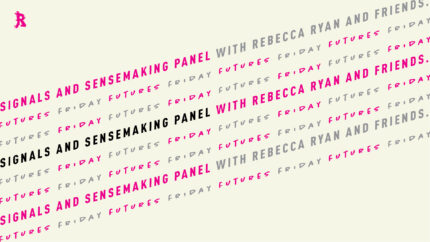 Futures Fridays: Signals and Sensemaking
Futures Fridays: Signals and Sensemaking
12:00 to 1:00 PM Central (Chicago)
Signals of the future are all around us. Join Rebecca Ryan + Friends to kick off our fall Futures Friday series with one of our most popular live events, Signals and Sensemaking.
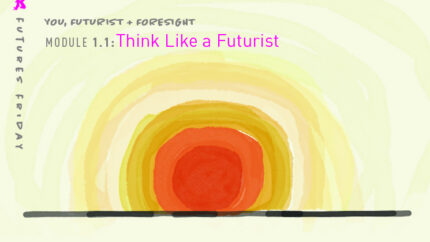 Futures Friday: You, Futurist + Foresight Module 1.1
Futures Friday: You, Futurist + Foresight Module 1.1
12:00 to 1:00 PM Central (Chicago)
[ 1.1 ]
Discuss ways to think long-term and how you might manifest them your life, e.g., your family, your work, your community.
[ Module 1 ]
Think Like a Futurist: Good futurists recognize their cognitive biases and work to overcome them. In this module, we discuss different types of thinking, examples of biases, and hacks and strategies to strengthen your futurist mindset.
Pre-reading will be sent via confirmation email following registration. Only registered participants will be able to access the event recording post-event!
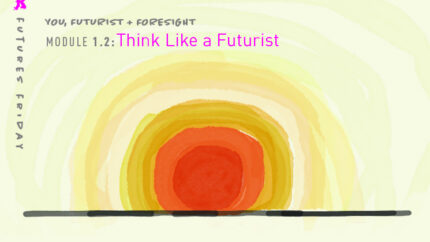 Futures Friday: You, Futurist + Foresight Module 1.2
Futures Friday: You, Futurist + Foresight Module 1.2
12:00 to 1:00 PM Central (Chicago)
[ 1.2 ] Discuss the differences between "fast" and "slow" thinking and how each one relates to strategic foresight. Explain how personal biases cloud foresight, individually and in groups.
[ Module 1 ] Think Like a Futurist: Good futurists recognize their cognitive biases and work to overcome them. In this module, we discuss different types of thinking, examples of biases, and hacks and strategies to strengthen your futurist mindset.
Successful participants will complete the pre-reading and come prepared to take notes, interact with their peers, and ask questions.
Pre-reading will be sent via confirmation email following registration. Only registered participants will be able to access the event recording post-event!
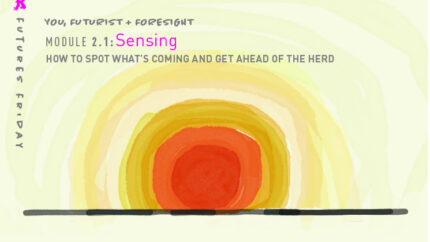 Futures Friday: You, Futurist + Foresight Module 2.1
Futures Friday: You, Futurist + Foresight Module 2.1
12:00 to 1:00 PM Central (Chicago)
[ 2.1 ] How foresight is used effectively to help people and organizations become future ready. Discuss the four-phase strategic foresight process and different ways to apply it.
[ Module 2 ] Sensing: How to spot what’s coming and get ahead of the herd. What's on your radar? What signals are you picking up about what is changing and what that might mean for your life, e.g., your family, your work, your community? In this module, we help you get set up to answer this question. We begin by introducing you to strategic foresight, followed by helping you define a domain for your research and practicing signal hunting and sensemaking.
Here is Rebecca giving the DL on our 4 phase strategic foresight process: https://lnkd.in/eni2Ejti
Pre-reading will be sent via confirmation email following registration. Only registered participants will be able to access the event recording post-event!
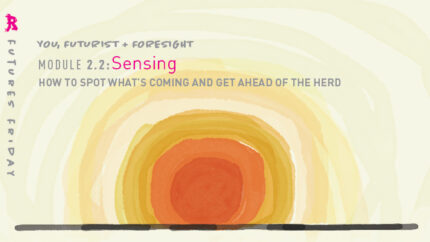 Futures Friday: You, Futurist + Foresight Module 2.2
Futures Friday: You, Futurist + Foresight Module 2.2
12:00 to 1:00 PM Central (Chicago)
[ 2.2 ] There are four-phases to the strategic foresight process and different ways to apply them. In this segment, we will learn how to define the domain for a strategic foresight project.
[ Module 2 ] Sensing: How to spot what’s coming and get ahead of the herd. What's on your radar? What signals are you picking up about what is changing and what that might mean for your life, e.g., your family, your work, your community? In this module, we help you get set up to answer this question. We begin by introducing you to strategic foresight, followed by helping you define a domain for your research and practicing signal hunting and sensemaking.
Pre-reading will be sent via confirmation email following registration. Only registered participants will be able to access the event recording post-event!
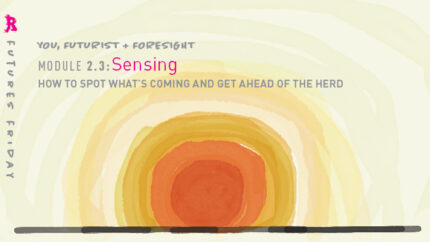 Futures Friday: You, Futurist + Foresight Module 2.3
Futures Friday: You, Futurist + Foresight Module 2.3
12:00 to 1:00 PM Central (Chicago)
[ 2.3 ] In this session we will practice the art of signal hunting and sensemaking. This session will wrap up Module 2.
[ Module 2 ] Sensing: How to spot what’s coming and get ahead of the herd. What's on your radar? What signals are you picking up about what is changing and what that might mean for your life, e.g., your family, your work, your community? In this module, we help you get set up to answer this question. We begin by introducing you to strategic foresight, followed by helping you define a domain for your research and practicing signal hunting and sensemaking.
Pre-reading will be sent via confirmation email following registration. Only registered participants will be able to access the event recording post-event!
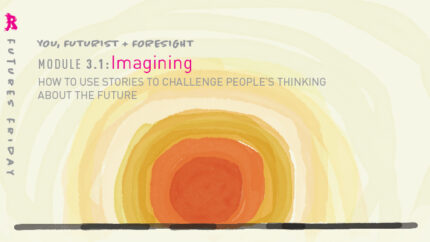 Futures Friday: You, Futurist + Foresight Module 3.1
Futures Friday: You, Futurist + Foresight Module 3.1
12:00 to 1:00 PM Central (Chicago)
[ 3.1 ] In this session we will discuss the three “Future Zones” as well teach you the characteristics of good scenarios.
[ Module 3 ] Imagining: How to use stories to challenge people’s thinking about the future.If we want better futures, we need better stories. In this module, we discuss and practice scenario development. What are they? How are scenarios used? What are the characteristics of good ones? What tools and techniques can I use to brainstorm and develop scenarios?
Pre-reading will be sent via confirmation email following registration. Only registered participants will be able to access the event recording post-event!
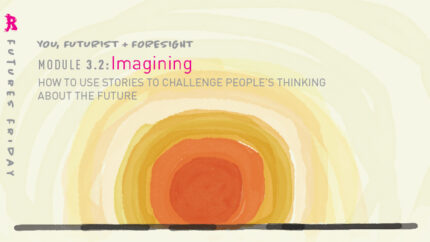 Futures Friday: You, Futurist + Foresight Module 3.2
Futures Friday: You, Futurist + Foresight Module 3.2
12:00 to 1:00 PM Central (Chicago)
[ 3.2 ] Discuss approaches to scenario brainstorming and learn how to construct a futures wheel for your domain!
[ Module 3 ] Imagining: How to use stories to challenge people’s thinking about the future. If we want better futures, we need better stories. In this module, we discuss and practice scenario development. What are they? How are scenarios used? What are the characteristics of good ones? What tools and techniques can I use to brainstorm and develop scenarios?
Pre-reading will be sent via confirmation email following registration. Only registered participants will be able to access the event recording post-event!
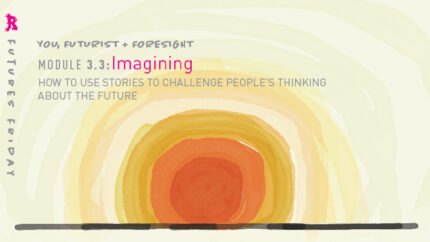 Futures Friday: You, Futurist + Foresight Module 3.3
Futures Friday: You, Futurist + Foresight Module 3.3
12:00 to 1:00 PM Central (Chicago)
[ 3.3 ] In this session we will discuss alternative approaches to scenario brainstorming and construct a scenario matrix for your domain,
[ Module 3 ] Imagining: How to use stories to challenge people’s thinking about the future.If we want better futures, we need better stories. In this module, we discuss and practice scenario development. What are they? How are scenarios used? What are the characteristics of good ones? What tools and techniques can I use to brainstorm and develop scenarios?
Pre-reading will be sent via confirmation email following registration. Only registered participants will be able to access the event recording post-event!
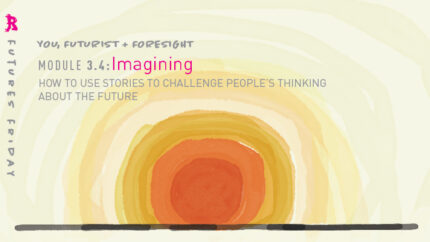 Futures Friday: You, Futurist + Foresight Module 3.4
Futures Friday: You, Futurist + Foresight Module 3.4
12:00 to 1:00 PM Central (Chicago)
[ 3.4 ] Discuss research and design options for scenarios with our scenario writer extraordinaire, Dr. Kay Daniels, APF.
|
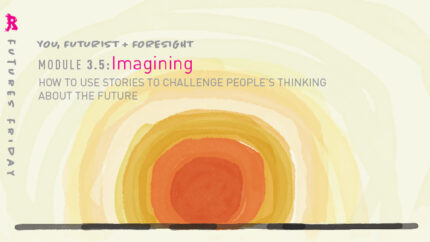 Futures Friday: You, Futurist + Foresight Module 3.5
Futures Friday: You, Futurist + Foresight Module 3.5
12:00 to 1:00 PM Central (Chicago)
[ 3.5 ] In this session we will outline or draft two alternative scenarios. This session will wrap up Module 3.
[ Module 3 ] Imagining: How to use stories to challenge people’s thinking about the future.If we want better futures, we need better stories. In this module, we discuss and practice scenario development. What are they? How are scenarios used? What are the characteristics of good ones? What tools and techniques can I use to brainstorm and develop scenarios?
Pre-work will be sent via confirmation email following registration. Only registered participants will be able to access the event recording post-event!
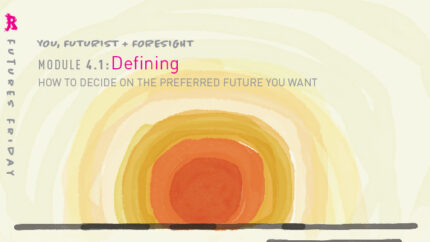 Futures Friday: You, Futurist + Foresight Module 4.1
Futures Friday: You, Futurist + Foresight Module 4.1
12:00 to 1:00 PM Central (Chicago)
[ 4.1 ] In this session we will explain what crossover levers are and how they are used and practice identifying shared levers between scenarios.
[ Module 4 ] Defining: How to decide on the preferred future you want. In this module, we shift from creating scenarios to actually using them. After asking “What could happen?” it’s now “What are you going to do about it?” The answers are a special set of strategies called "crossover levers." We discuss what exactly such levers are and practice identifying them.
Pre-reading will be sent via confirmation email following registration. Only registered participants will be able to access the event recording post-event!
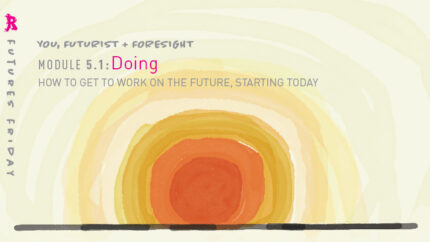 Futures Friday: You, Futurist + Foresight Module 5.1
Futures Friday: You, Futurist + Foresight Module 5.1
12:00 to 1:00 PM Central (Chicago)
[ 5.1 ] Practice constructing framing questions with Strategic Doing to start taking action on major strategies.
[ Module 5 ] Doing: How to get to work on the future, starting today. When the plan is done, the real work starts. In this final module, we cover how you can use the Strategic Doing approach to start taking action on major strategies. We will practice constructing "framing questions" that will help you translate strategic directions into high-impact pilot projects. Such projects can help you immediately build momentum for the future and vision you have created.
Pre-reading will be sent via confirmation email following registration. Only registered participants will be able to access the event recording post-event!
Registration link coming soon!
12:00 to 2:00 PM Central (Chicago)
Participants who complain about Zoom fatigue haven’t
experienced engaging, well-run online meetings. Whether you are a coach,
a facilitator, or a team leader, you know that online meetings are here
to stay.
Join three trainers with over 30 years of experience for an information-packed, hands-on workshop where you will learn, experience, and practice 17 techniques to use BEFORE, DURING, and at the CLOSE of online meetings.
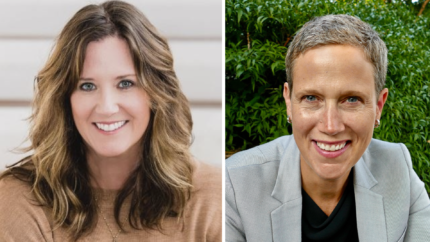 Are You Okay? Even Visionaries get the Blues with Kate Moreland & Rebecca Ryan, APF
Are You Okay? Even Visionaries get the Blues with Kate Moreland & Rebecca Ryan, APF
12:00 to 1:00 PM Central (Chicago)
Change is hard. It often relies on guidance from you - forward-thinking leaders who light the way and keep people motivated. But even the most inspiring leaders can face moments of doubt and exhaustion.
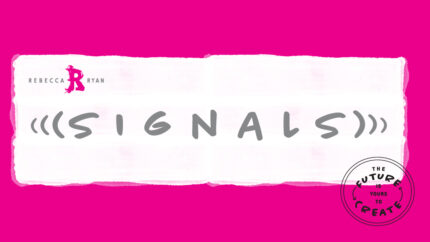 The future of communities: Live signals and sensemaking panel
The future of communities: Live signals and sensemaking panel
4:00 to 5:00 PM Central (Chicago)
Ever wondered where the next big shift is coming from? It's not in the headlines you read today but in the subtle signals lurking in the shadows. MIT Sloane believes that spotting and interpreting these signals is an essential skill for leaders.
12:00 to 1:00 PM Central (Chicago)
Imagine a world a decade from now. How prepared are you to thrive? Join Rebecca Ryan, an economist and top-50 professional futurist, for an exclusive session on: "Ten Trends You'll Face in the Next Ten Years."
12:00 to 1:00 PM Central (Chicago)
2024 is expected to be a year of disruption. Times of disruption favor leaders with a clear and relevant vision who are prepared to innovate and take bold action.
In this live event, economist and top-50 professional futurist Rebecca Ryan, APF and her colleague will discuss the threats and opportunities inherent in disruption, plus results of the 2024 Leadership Survey:
* What tailwinds are expected to accelerate progress?
* What headwinds are expected to impede progress?
* What weak signals - early change indicators - have leaders' attention now?
* What "black swans" - unexpected events - could significantly alter the trajectories of American businesses, communities, and nonprofits?
Panelists include:
* David G. Brown, award-winning Chamber executive, catalytic leader and community-builder
* Yasemin Arikan, MA, futurist and social scientist
All registrants will receive:
* 30-day access to the event recording
* A PDF of the report, "Now + Next: Leaders’ Optimism for the Near Term + Concerns About the Future"



